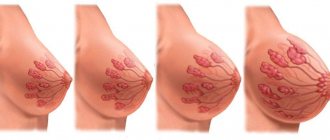Changes in the mammary glands after conception
Before we figure out when breasts begin to hurt after conception, let’s find out what changes occur in the mammary glands during pregnancy.
The main reason for the appearance of characteristic heaviness and pain in the chest after conception is hormonal changes. In particular, the level of hCG begins to increase - human chorionic gonadotropin - the production of which is produced by the placental membrane of the embryo. And it is the growth of hCG that stimulates an increase in the number of glandular cells in the breast, due to which, in fact, its increase occurs.
The pain is caused by the fact that the connective tissue remains at the same level. In this case, there is pressure from the glandular tissues on the nerve endings in the mammary glands and disruption of the blood supply, which causes unpleasant painful sensations. The breasts swell and become heavier, their size may increase several times.
Can breasts not hurt after conception? Restructurings related to changes in the mammary glands as a result of pregnancy are purely individual. It is impossible to say unequivocally that the symptoms will be the same for all women. Some become aware of their “interesting situation” only after a small belly begins to appear, while others begin to feel some changes in the body already a few weeks after conception.
The most common signs of pregnancy regarding changes in the mammary glands include:
- a feeling of heaviness in the chest;
- swelling of the mammary glands;
- increased sensitivity;
- colostrum discharge - if the discharge contains blood and/or purulent impurities, you should urgently consult a specialist, as this may be one of the signs of a miscarriage or a threat of pregnancy failure;
- darkening of the nipples and peripapillary circle.
For reference! During the second pregnancy, changes in the mammary glands are not as noticeable. This is due to the fact that the breasts have already undergone changes once and returned to their original appearance, and during a second pregnancy, micro tears in the connective tissues and other changes that cause pain will no longer be observed.
Signs of illness
When is pain a sign of illness? In what cases is pain a sign of illness?
- Mastopathy. A benign tumor in the breast also causes pathological tissue growth and leads to pain. As a preventive measure, it is necessary to have a mammogram once a year and be examined by a mammologist. Self-monitoring and self-examination of the condition of the mammary glands is no less important.
- Mammary cancer. The disease is scary because painful sensations appear in the later stages of the disease, when it becomes not local, but systemic. Preventive measures are the same as for mastopathy.
- Consequences of injury. Women who exercise vigorously may not notice breast injuries. Subsequently, they make themselves felt by pain.
- Inflammatory processes in the mammary gland. As a rule, along with the pain, weakness, chills appear, the temperature rises, and the skin turns red.
In order to understand the physiological chest pain or symptom of the disease, it is necessary to do several pregnancy tests at intervals of 3-5 days. The absence of two stripes is a signal that you need to visit a mammologist, but in the case of a positive test, you need to go to a gynecologist, register and undergo the necessary diagnostic tests.
When do breasts start to hurt during pregnancy?
We figured out how breasts hurt after conception. Now let’s find out when noticeable changes in the mammary glands can begin during conception.
As mentioned earlier, the course of pregnancy is purely individual. Breast swelling and increased sensitivity occur at different times for everyone. Guided by unspoken statistics, the data of which was obtained from forums on the relevant topic, tangible changes occur on the 6th day after conception or a week after the date of the delay.
This is interesting! Medical studies have shown that overweight women experience changes in the mammary glands even before the first day of the expected new menstrual cycle.
Do breasts always become fuller after conception? The mammary glands always swell during pregnancy, but the period at which this happens is different for everyone.
You need to know this! Experts say that sometimes breast enlargement occurs only in the fourth month of pregnancy, and sometimes six months after conception. This in no way affects the normal course of pregnancy.
How to reduce pain?
Similar phenomena occur in almost every woman who is “in position.” Expectant mothers should be patient and use pain relief methods:
- Take a warm shower
, and from the second trimester a contrast shower; - Do not use soap
, this will cause dry breast skin. You can use special hygiene products for pregnant women; - Perform physical exercises
for expectant mothers, this helps blood flow and also tightens the chest muscles; - Choose the right bra;
it should support your breasts, not squeeze them, should be made of environmentally friendly materials, should be easy to adjust to changes in your breasts, and have wide straps. It is recommended to minimize the wearing of underwear with lace and decorative elements. - Choose sleepwear
, in order to avoid uncontrolled movements during sleep, it should not compress the chest and should be made of natural materials. - The breast skin may stretch and itch; to avoid this, use light creams
.
Additional signs indicating pregnancy
Breast tenderness is not the only sign of pregnancy. There are still a huge number of symptoms indicating the development of new life in the womb, and all of them are of a purely individual nature.
The main signs of an interesting situation include:
- Nagging pain in the uterine area. Most women experience similar sensations during menstruation. When an egg is fertilized, painful sensations in the lower abdomen can begin 2 days before the expected date of menstruation and persist for 7 days after it. In this case, you need to be especially careful about this sign, since it can also warn of a possible threat of miscarriage.
- An increase in basal temperature, which is caused by a change in the level of progesterone in the blood. An increase in BT levels occurs in several cases: before ovulation, in the first days after successful fertilization of an egg by a sperm and in the presence of certain pathological conditions and diseases of the reproductive system. During pregnancy, the thermometer will show 37°C-37.5°C. It is extremely important to follow all the rules for measuring basal temperature. This is written in more detail in one of our previous publications.
- Frequent urge to urinate. Observed for a period of 2 to 3 weeks. The reason for this is an increase in the concentration of sex hormones and increased blood circulation in the pelvic organs.
- Constant feeling of drowsiness and fatigue. This condition is also caused by increased progesterone levels.
- Disorders of the gastrointestinal tract. One of the most common signs of pregnancy. This can be manifested by diarrhea, flatulence, constipation, vomiting, nausea, especially in the first half of the day. Gastronomic preferences may change and the sense of smell may become more acute.
- Delay of menstruation. On the day of the expected menstruation, spotting may appear, but full menstruation will not occur if the fetus is already developing in the woman’s body. Although in some cases, menstruation can occur even after pregnancy - we also talked about this in one of our previous articles.
What are the reasons for chest pain during pregnancy?
Some women experience pregnancy completely asymptomatically and find out about it only by a positive test. Others, on the contrary, recognize the onset of conception by their own subjective feelings. Women who have already given birth know especially well what it means when the chest hurts during pregnancy, there is no or very strong appetite, nausea appears, attacks of headaches, a feeling of drowsiness prevails, nagging pain in the lower abdomen occurs, etc.
The set of such symptoms may be different for each woman, and they are all a sure sign of pregnancy. Most expectant mothers, especially first-time mothers, do not know why their breasts hurt so much at the very beginning of pregnancy, how long this symptom will accompany the pregnancy process, and what to do to stop the pain in their breasts. This and other changes in the body are a natural consequence of changes in the level of female sex hormones.
Table of contents of the article - you can go to the desired section
Bottom line
Summarizing all of the above, let's summarize: breast enlargement and its high sensitivity are a sure sign of pregnancy. Such changes in the mammary glands occur in absolutely all women after conception. The only difference is when it happens and with what intensity. Some people feel changes a few days after the fertilization of the egg by the sperm and the attachment of the fertilized egg to the wall of the uterus, but for others these pains are not so noticeable that they are not perceived as a sign that a new life has already arisen inside.
During conception, the breasts may not hurt, but the following changes will still be felt: they will begin to increase in size, a venous network and even stretch marks may appear.
Have you ever observed or heard from friends about changes in the mammary glands during conception? Perhaps you have already experienced these changes personally? If so, did everything happen as it sounds in theory?
Causes of painful symptoms in the breasts during pregnancy
The breasts of the expectant mother already at the very beginning of pregnancy undergo some changes. This is due to an increase in female sex hormones in the body. Their formation creates normal conditions for the development of the fetus, as well as its gestation throughout 9 months. In particular, the hormone - human chorionic gonadotropin - causes enlargement, swelling and weighting of the mammary glands. So, the female breast begins to prepare for the upcoming feeding. Also, a clear manifestation of the venous network often begins to be observed, as the flow of blood to the chest increases. It is even possible to release colostrum .
From the first days of pregnancy, fat mass begins to rapidly increase in the mammary glands. Sometimes the connective tissues cannot keep up with its growth, and they rupture. In its place, you can observe so-called stretch marks, which at first, due to burst vessels, have a pale pink color, and then become white and inconspicuous against the general background.
Characteristic symptoms begin to appear in different women at different times after conception. This may be the immediate beginning of conception, or perhaps the period before the first expected menstruation, etc. Sometimes the breasts begin to swell and hurt by 5-7 weeks of pregnancy or not hurt at all. By the end of the first trimester of pregnancy, the expectant mother begins to note that the pain has disappeared.
In practice, pregnant women describe this condition in different ways. So, the most characteristic symptoms and bursting sensations in the chest area include the following:
- the mammary glands become engorged;
- become heavier;
- tingling sensations are felt;
- the breasts become rounded and increase in size;
- there is a feeling of heaviness;
- painful sensations appear, especially upon contact with clothing or linen;
- pain radiates to the armpit or to the side of the arm;
- nipples become rough, swollen, itchy and dark.
In this case, at the beginning of pregnancy, one mammary gland or both may hurt at the same time. The nature of the pain varies in intensity: from barely noticeable discomfort to almost unbearable pain. Due to the appearance of such completely new sensations, women cannot get enough sleep, become irritable and nervous over trifles. However, it is worth understanding why such changes occur, that they are classified as physiological, do not pose a health hazard, are considered normal, and you need to be a little patient.
When to see a doctor
The most dangerous disease is breast cancer. If such a disease has begun, the woman may not be bothered by pain. It is necessary to periodically examine your breasts. Even a small lump in the breast should be a reason to immediately visit a mammologist or gynecologist.
Any pain that develops in the chest should alert a woman. Do not think that its cause is only PMS or pregnancy. It is necessary to go directly to a specialist who deals with women's diseases. This must be done so as not to miss a serious illness.
In any case, every woman should regularly, at least once a year, undergo a preventive breast examination and visit a mammologist.
How to overcome pain
Painful sensations in the chest are normal, but the condition can be significantly alleviated if you follow the rules. The skin needs to breathe, so you need to shower regularly. Linen must be made from natural materials.
There are special bras for pregnant women. These bras have wide straps that hold the cups, they do not rub the skin, there are no protruding bones, seams or decorative elements. They are worn during the day, at night the breasts should rest and breathe, so it is better not to wear a bra at night.
If your nipples hurt, breast massage helps. Massaging movements should not be too intense. To carry out the procedure, you can use baby oil. After the massage you will need to take a shower.
How long do breasts hurt during pregnancy and how long does it last?
First of all, a woman needs to calm down and stop panicking, because every expectant mother experiences similar sensations. The periods of chest pain and their duration directly depend on the unique characteristics of the expectant mother’s body, so it is impossible to say exactly when exactly the chest pain will go away. In some women, breast changes occur sharply and quickly, while in others, on the contrary, the breasts itch for a long time and are very painful. You can often notice the appearance of a so-called venous network on the chest of a pregnant woman. This is due to increased blood supply to the mammary glands.









